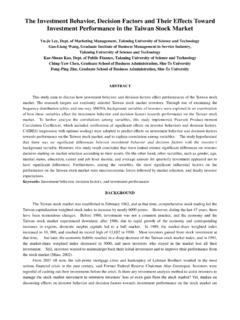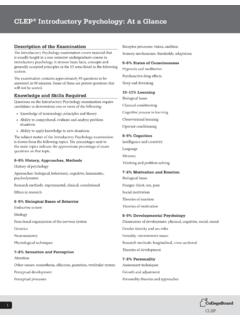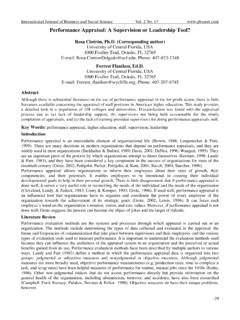Transcription of Journal of Vocational Behavior
1 Journal of Vocational Behavior 83 (2013) 428 436. Contents lists available at SciVerse ScienceDirect Journal of Vocational Behavior Journal homepage: Research on calling: What have we learned and where are we going? Ryan D. Duffy a, , Bryan J. Dik b a University of Florida, USA. b Colorado State University, USA. a r t i c l e i n f o a b s t r a c t Article history: Work as a calling is an emerging concept for scholars across a variety of psychological Received 11 April 2013 disciplines. In the current paper, the extant literature on calling is reviewed, showcasing its Available online 21 June 2013 salience among college student and adult populations and highlighting consistent links between perceiving a calling and heightened levels of career maturity, career commitment, Keywords: work meaning, job satisfaction, life meaning, and life satisfaction.
2 These links appear most Calling robust when individuals are actually living out their calling at work. Seven suggestions are Well-being proposed for future researchers to better understand what it means to have and live a calling: Review developing a stronger conceptual understanding, collecting more longitudinal data, studying more diverse cultural groups, focusing on behavioral outcomes, examining the dark side of a calling, building theory, and testing interventions. It is hoped that the promising research base and vast areas of potential growth will continue to make the study of calling attractive to scholars across psychological disciplines.
3 2013 Elsevier Inc. All rights reserved. 1. Introduction It's relatively easy to recognize the importance of calling within popular culture. As a slogan for , as a lesson in Oprah's LifeClass, or as a focus for the Dali Lama's latest book on happiness, the notion of finding and living out one's calling in the context of work is indeed an emergent concept. Despite literally centuries of wisdom on the topic from theologians and philosophers, only a handful of empirical studies on calling were available in the social science literature prior to 2007, the apparent tipping point. Since that time, research on the concept has burgeoned, resulting in a corpus of findings across a range of subdisciplines within psychology (and related fields such as organizational Behavior and management) that inform how calling relates to proximal work and well-being variables.
4 In this paper, we begin by discussing the different ways calling is defined in the literature. Next, we provide a narrative review of the research on calling and, based on insights and limitations from this research, provide suggestions for future scholarship in this area. 2. What calling means The conceptual meaning of calling represents perhaps the most controversial issue within the literature. Although a calling has been described as an orientation (Bellah, Madsen, Sullivan, Swidler, & Tipton, 1986), mind-set, or perspective (Dik & Duffy, in press-a,b), most scholars frame calling as a psychological construct that may be folded into larger career theories or interventions, rather than a new theory of career development or career counseling analogous to well-studied Vocational constructs like self-efficacy or outcome expectations.
5 Nevertheless, there is no consensus on how the term is defined, and current approaches are diverse, but can be organized using a general distinction between neoclassical and modern definitions. Echoing an earlier Corresponding author at: University of Florida, Department of Psychology, PO Box 112250, Gainesville, FL 32611, USA. E-mail address: rduf@u .edu ( Duffy). 0001-8791/$ see front matter 2013 Elsevier Inc. All rights reserved. Duffy, Dik / Journal of Vocational Behavior 83 (2013) 428 436 429. observation by Baumeister (1991), Bunderson and Thompson (2009) noted that neoclassical approaches reflect how the term has been understood historically, and emphasize a sense of destiny and prosocial duty.
6 In contrast, modern approaches generally focus on an inner drive toward self-fulfillment or personal happiness. This debate over which definition is the right one is arguably more of a linguistic question than a scientific one, particularly given evidence that research participants also are divided in terms of how they understand the term ( , Hirschi, 2011). As Wrziesniewski (2012) summarized, it is a sign of the evolving and dynamic nature of research on callings that the definition of callings is the subject of ongoing debate (p. 46). In their review of the range of definitions across the humanities and social sciences, Dik and Duffy (2009) identified three components that, when combined, were emblematic of a calling in the work domain.
7 The first was the notion of an external summons that if an individual feels called to a specific type of work, this necessarily implies a caller, which may come in the form of a higher power, the needs of society, a family legacy, the needs of one's country, or any other force external to the individual. This component is consistent with the literal meaning of calling and with how the term has been used in the context of work historically. The second component is that a person's approach to work aligns with her or his broader sense of purpose in life; for such individuals, work is either a source of purpose in life, or serves as a life domain that allows an expression of a sense of purpose.
8 The third component is that a person's career is prosocially oriented; that is, individuals with a calling use their career to directly or indirectly help others or advance the greater good. The combination of these three components an external summons, meaning/purpose, and prosocial motivation is what distinguish calling from closely related constructs such as work centrality (Dubin, 1956), work commitment (Loscocco, 1989), work engagement (Kahn, 1990), meaningful work (Rosso, Dekas, & Wrzesniewski, 2010), and prosocial work behaviors (Grant, 2007, 2008). Furthermore, Dik and Duffy (2009) suggested that individuals endorse a calling along spectrum (not simply having one versus not having one), introduced a distinction between seeking and experiencing a calling, described calling as an ongoing process rather than something to be discovered once and for all, and proposed that callings often change over time.
9 This conceptualization of calling has informed what are currently the two most widely used instruments to assess calling in empirical research (Dik, Eldridge, Steger, & Duffy, 2012). Qualitative studies with college students (Hunter, Dik, & Banning, 2010) and working adults who view their career as a calling (Bunderson & Thompson, 2009; Duffy, Foley, et al., 2012; Hernandez, Foley, & Beitin, 2011) have assessed how individuals actually define the term. In accordance with the second and third components of Dik and Duffy's (2009) definition, calling is most often defined as a highly meaningful career that is used to help others in some fashion.
10 In these studies, participants described a remarkable range of sources of the calling, some external ( , God, a higher power), some internal ( , one's own interests, skills, values, and passions), and some that may fall in the overlap of internal and external, such as a sense of destiny ( , what one is meant to do). Some scholars have argued that these internal source conceptualizations are a better fit for how the construct is viewed in the current culture, noting that many individuals who feel a calling do not identify an external caller, but rather point to working in the career that aligns with their strongest internal passions (Dobrow & Tosti-Kharas, 2011; Elangovan, Pinder, & McLean, 2010; Hagmaier & Abele, 2012; Hall & Chandler, 2005).






